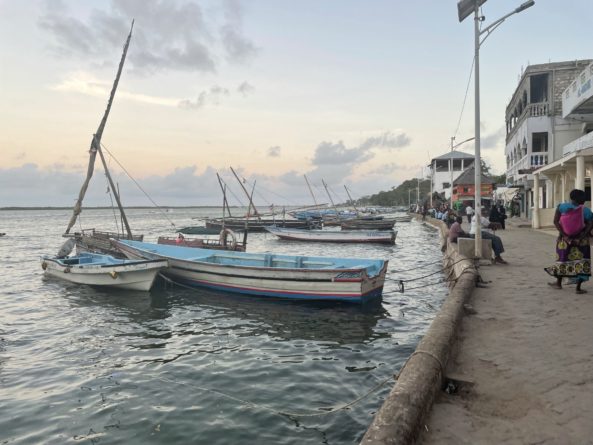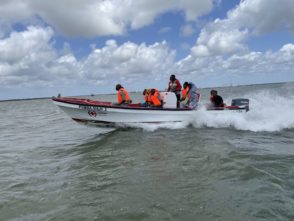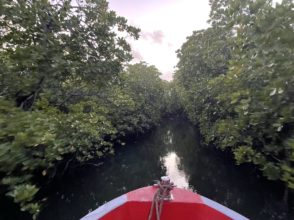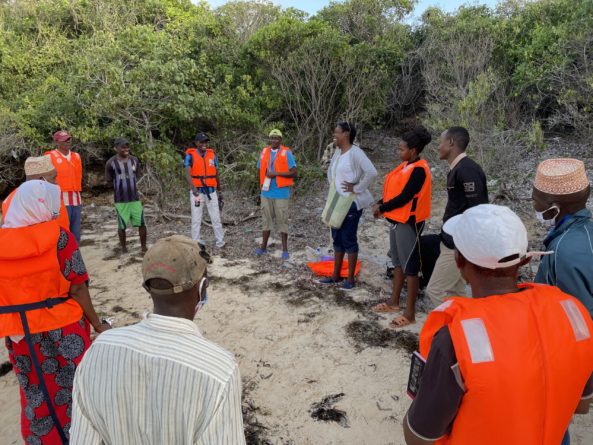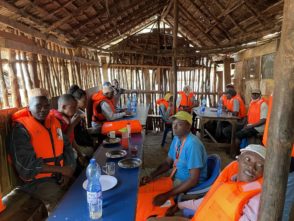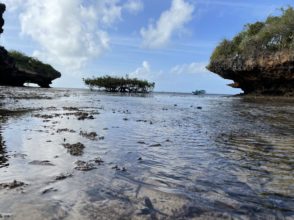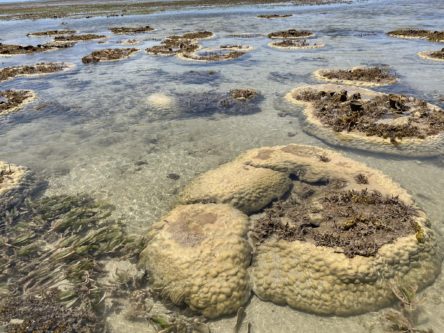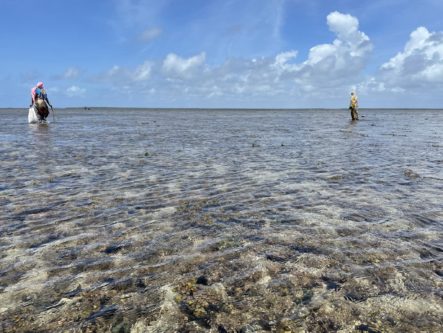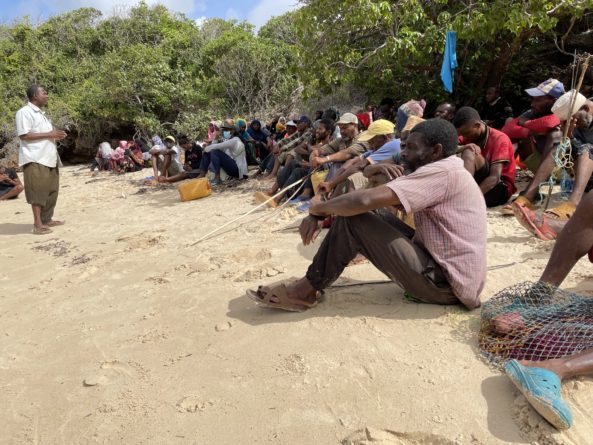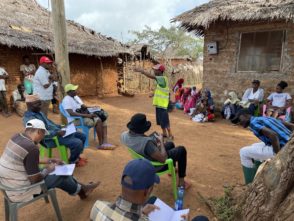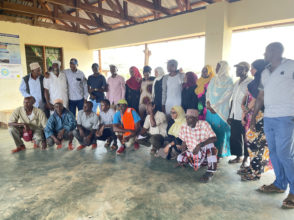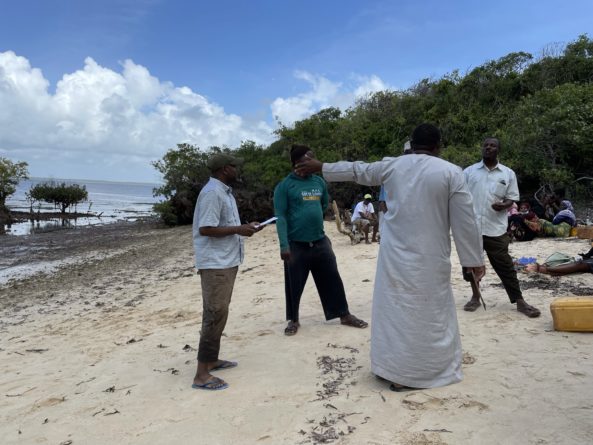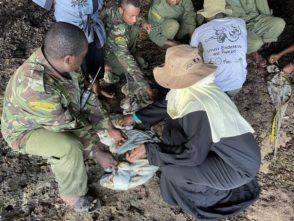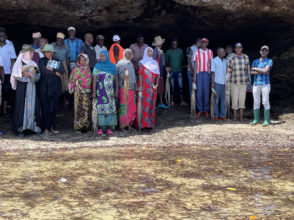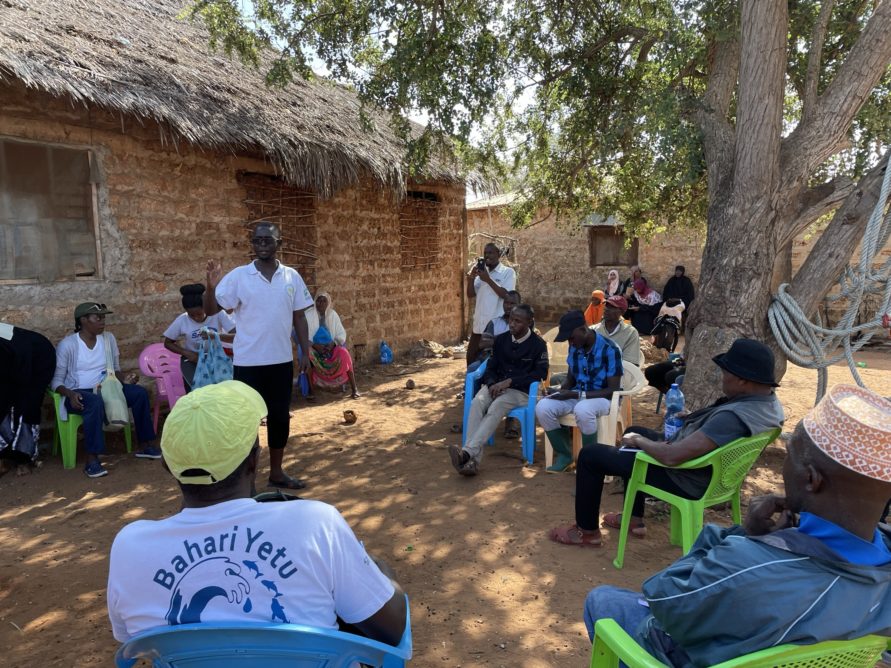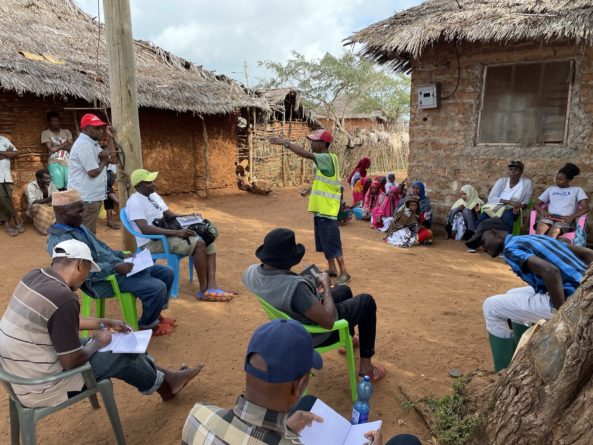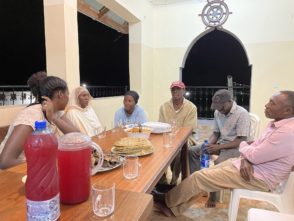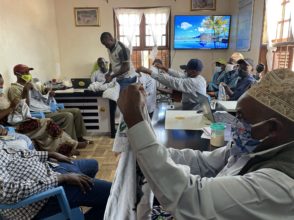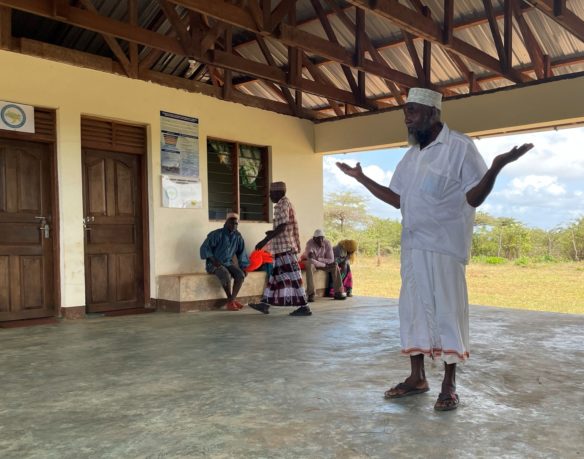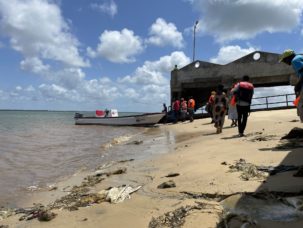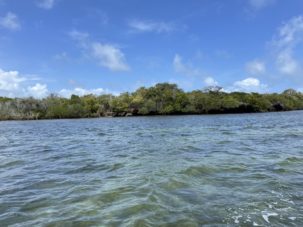Munje to Pate – the start of learning
There was hope and excitement as nine community members, seven men, and two ladies from Munje in southeast Kenya, boarded a shuttle bus for a nine-hour journey to Lamu. Our mission was to learn and to document the challenges, lessons learned and successes of the Pate Marine Community Conservancy following their conservation efforts in octopus fishery closures, mangrove conservation, and community economic incentives in the form of micro-finance solutions – also known as table banking.
Our partner – COMRED and the Munje Beach Management Unit, had planned to do this learning exchange visit for some time, but COVID-19 had caused delays. Thankfully we were all cleared to visit after receiving negative COVID-19 test results. As the bus started on the road, the Munje BMU members told me they were eager to see evidence of collaboration across the community and, in particular, the leadership roles that women from Pate Island had taken up.
The Pate fisher community has not always had it easy, struggling to get good fish catch numbers from their common fishing grounds in the past. However, a partnership between the Northern Rangeland Trust (NRT) and The Nature Conservancy (TNC) back in 2018 led to the establishment of the Pate Marine Community Conservancy (PMCC) – marking the start of a community-led marine conservancy that has successfully worked in the community’s favour. How? Following a partnership between The Nature Conservancy and Blue Ventures, the Pate community representatives had a chance to visit Andavadoaka in Madagascar in 2018. They witnessed women gleaning octopus for the first time and a community-managed octopus fishery closure. This exchange visit led to the sharing of knowledge with other members of PMCC, which led to the establishment of a permanent reserve and the implementation of the temporary closure that has boosted octopus catch numbers.
But why visit Pate?
The Munje BMU community had previously set up a locally marine-managed area (LMMA) for fish stocks recovery. However, they harvested a lot of octopus during the first opening. They decided to establish a temporary octopus fishery closure – an initiative that they had hoped would lead to improved catch. However, the temporary closure didn’t go well due to a lack of proper patrol and enforcement challenges and disagreements in the closure management, such as opening and closing periods. The Munje BMU members requested COMRED and Blue Ventures to support the creation of another temporary octopus fishery closure, but with more comprehensive consultations and a clear management structure. The first step to reviving this closure included the learning visit for the group, and the Pate fisher community was the best to learn from as the two communities shared similarities in culture, way of life, and religion – social factors that would ease the process of learning. The learning exchange coincided with the conservancys’ octopus fishery closure opening so the Munje BMU members would witness the process.
This journey started in Madagascar, but we are happy that the student (the Pate community) is now the teacher, building new Kenya to Kenya community exchange to strengthen management.” – Agatha Ogada, Regional Support Partner Coordinator, Blue Ventures.
Pate – embracing equality for community engagement
Cultural differences do not always need to be a barrier to learning. The Pate community embraced differences when they visited and observed the Vezo community in Andavadoaka in Madagascar. This visit was an eye-opener for the visitors from Pate. It showed them how a community could succeed if men and women collaborated in management activities and governance. Following the exchange, the Pate fisher representatives narrated how they became advocates for change – calling on fellow community members and other BMUs to embrace collaboration, support, and getting more women actively involved in decision making. For the past four years, the Pate community has successfully benefitted from temporary octopus fishery closures, mangrove restoration activities, and community microfinance. Due to the Pate community’s success, they were best placed to share their experiences with the members of Munje BMU.
The closure has helped us as we earn from it… we can take care of our families more” – Zulfa Hassan, Chairlady – Mtangawanda mangrove restoration group, Pate – Lamu – Kenya.
Unlearning and learning: Culture shocks, surprises, and similarities
After the night’s sleepover in Lamu, we boarded a speedboat to visit the Pate Marine Conservancy closure in Shanga-Ishakani to start the learning visit. The conservancy has permanent (no-take) and temporary closure zone patrolled by rangers – community members picked from the Pate fisher community and trained by the Kenya Wildlife Service to support conservation initiatives. The day started with prayers and an introduction to the history of the closure. The closure is opened for one week after four months to allow the octopus to grow and reproduce in large numbers. We were pleasantly surprised when an auction was held to set the price of the catch. This exercise, adopted to ensure the community benefits from a reasonable price, was proposed by the members to ensure fairness and reduce middlemen exploitation. The day’s price was the highest since the start of COVID-19.
As the tide receded, the flat reef was exposed, and the Pate community members, both women, and men headed out to glean. The Munje BMU members were surprised as their women do not go out to fish! After gleaning, catch data was recorded as part of the monitoring done by the community through its rangers. After gleaning was complete, we attended a session on the community table banking model – a revolving fund set up by the community with the help of NRT to provide loans to members of the conservancy. A revolving fund, in this case, is an account where income from loan repayments, conservancy fees, and octopus catch sales provide members with interest-free loans. A night in Faza for a debriefing and sleepover marked the end of day one – with the community excited to explore another island tomorrow.
A visit to the PMCC offices in Mtangawanda for a lesson on octopus biology and ecology by the conservancys’ advisor – Mzee Misbou, marked the end of the learning visit. Mzee Misbou, a retired fisheries officer, also gave the Munje BMU members knowledge on the best period of a closure, how and when to close the fishery, and the use of data in monitoring. A briefing on other activities, such as the mangrove restoration led by the Pate women, also allowed members to explore similarities between the two communities. Notably, Munje BMU has a women-led mangrove restoration group, the Tunusuru conservation group, that plants and sells mangroves seedlings and keeps honey bees. After this session, we returned to Lamu, allowing the Munje BMU team time to reflect and prepare for the long bus journey home.
What next?
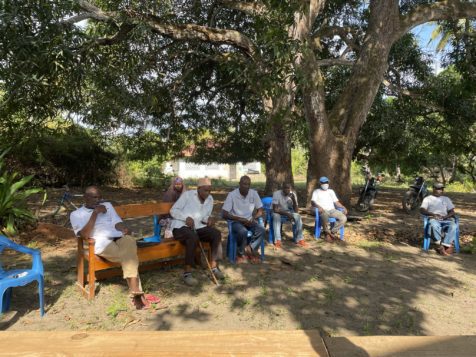
Munje BMU members during a debrief in Munje after the visit | Credits: Randall Mabwa, Blue Ventures
After our return to Munje, the BMU members were optimistic about what they could achieve as a community if all the neighbouring BMUs sharing the same fishing grounds agreed to set a closure and run it jointly, similar to what they had witnessed with Pate MCC. The exposure to the activities undertaken by the Pate fisher community inspired the members to rethink some of their practices that have impacted the success of fisheries management to date. The result? The community members agreed to work together as equals, as they are keen to achieve success and rebuild their fisheries. Once again, peer-to-peer learning has proven a huge catalyst to change, and we are optimistic that the Munje community and neighbouring communities will partner to bring about real change.
What we are now left to do is to sensitize the rest of the BMU members so that we can start reviving our octopus fishery closure” – Hassan Rengwa, Chair – Munje BMU.
We would like to acknowledge our partner COMRED for their work with the Munje fisher community; The Northern Rangeland Trust (NRT), and the Pate Marine Community Conservancy for hosting us during the learning visit.


